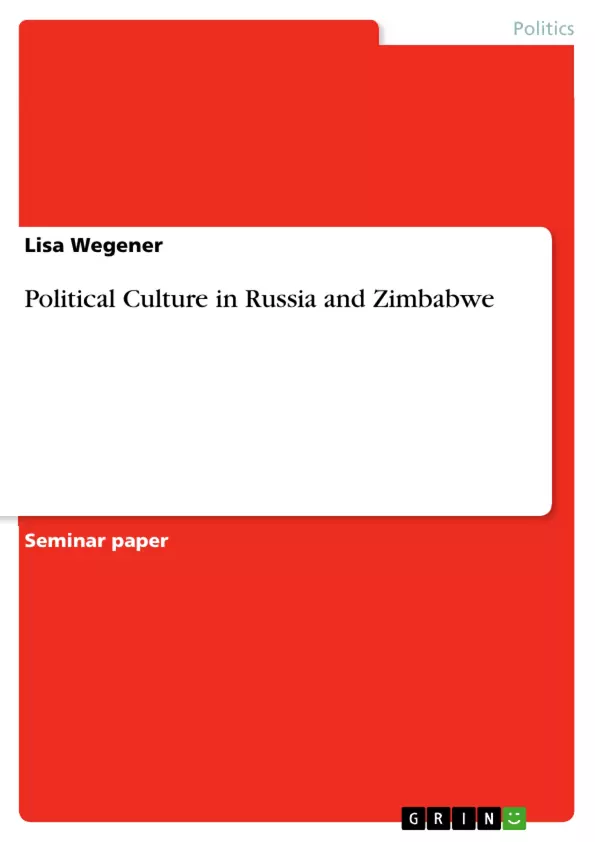In the following paper the attempt shall be made to compare Russia and Zimbabwe with
regard to their political culture. The first impression might suggest that there is an immense amount of differences which make a comparison between these countries rather
implausible. Nevertheless I assume to discover a couple of similarities as far as the political culture is concerned. This assumption is based on the fact that both countries are nominal democracies with constitutions, party systems, elections being held etc. but with a strong deflexion towards authoritarianism. It is generally agreed nowadays that democracy as a form of government can only be successfully implemented if the actors and citizens
internalise it as a form of life and thinking as well – so maybe a failing democracy can also be explained by a failed internalisation of democratic values. Secondly, from its independence until the breakdown of the Soviet Union, Zimbabwe has been fairly oriented in the direction of the communist Russia.
After having explained the basic theoretical background of the issue of political culture, I am going to give a brief summary of important, more recent historical developments in the countries. Subsequently, I am going to examine the political culture of both Russia and Zimbabwe which will finally lead to a comparison and conclusion.
Inhaltsverzeichnis (Table of Contents)
- Introduction
- Theoretical Background
- Historical Background
- Russia
- Zimbabwe
- Political Culture
- Russia
- Zimbabwe
- Comparison & Conclusion
Zielsetzung und Themenschwerpunkte (Objectives and Key Themes)
This paper compares the political cultures of Russia and Zimbabwe, examining similarities despite apparent differences. It explores how these nominally democratic countries, exhibiting authoritarian tendencies, reflect the internalization (or lack thereof) of democratic values. The analysis uses theoretical frameworks of political culture and civil society to understand the interplay between objective political structures and subjective consciousness.
- The definition and components of political culture.
- The role of historical context in shaping political culture.
- The influence of factors like ethnicity, religion, and media on political socialization.
- The relationship between political culture and civil society.
- Comparison of political culture in Russia and Zimbabwe.
Zusammenfassung der Kapitel (Chapter Summaries)
Introduction: The introduction posits a comparative analysis of the political cultures of Russia and Zimbabwe, acknowledging initial disparities but anticipating shared characteristics stemming from their nominal democracies with authoritarian leanings. The methodology is outlined, focusing on theoretical background, historical context, and a comparative analysis.
Theoretical Background: This section defines political culture, highlighting its multifaceted nature encompassing beliefs, symbols, values, and sentiments. It discusses the influence of various factors (ethnicity, religion, etc.) and the significance of political socialization. The relationship between political culture and civil society is also addressed.
Historical Background (Russia): This section summarizes key historical events in Russia, starting with Gorbachev's reforms, the collapse of the Soviet Union, Yeltsin's presidency, and the rise of Putin. The focus is on political and economic shifts impacting the political landscape.
Historical Background (Zimbabwe): This section details Zimbabwe's history, from its colonial past and independence struggles to the Mugabe era. Key events like the UDI, guerilla warfare, and the land redistribution campaign, along with their political and economic consequences, are highlighted.
Political Culture (Russia): This section analyzes the evolution of Russian political culture post-Soviet era, discussing the impact of Glasnost, the rise of nationalistic sentiment, and the nature of the political party system. The role of media and the establishment of a broad centrist consensus are examined.
Political Culture (Zimbabwe): This section explores the political culture of Zimbabwe, focusing on the legacy of colonial rule and the consequences of Mugabe's leadership. The influence of economic and social factors on political attitudes is considered, but without delving into the complexities of the post-Mugabe era.
Schlüsselwörter (Keywords)
Political culture, Russia, Zimbabwe, authoritarianism, democracy, civil society, political socialization, historical context, comparative politics, Glasnost, Perestroika, land redistribution, nationalism, economic development.
Frequently Asked Questions
What is the main objective of the comparison between Russia and Zimbabwe?
The paper compares the political cultures of Russia and Zimbabwe to discover similarities in how these nominal democracies exhibit strong tendencies toward authoritarianism despite their different geographical and historical backgrounds.
How is political culture defined in this study?
Political culture is defined as a multifaceted concept encompassing the beliefs, symbols, values, and sentiments that citizens internalize regarding their government and political system.
What role does historical context play in shaping these political cultures?
For Russia, the transition from the Soviet Union through Yeltsin to Putin is central. For Zimbabwe, the legacy of colonial rule, independence struggles, and the long leadership of Robert Mugabe are the primary historical drivers.
Why does the author suggest some democracies fail?
The author posits that democracy can only be successful if citizens and political actors internalize democratic values as a way of life; a "failed democracy" often stems from a failed internalization of these values.
What specific Russian developments are analyzed?
The analysis focuses on the impact of Glasnost, the rise of nationalistic sentiment, the role of the media, and the evolution of the political party system in the post-Soviet era.
What factors are considered in the political socialization of Zimbabwe?
The study explores the legacy of colonial rule, economic factors, and social attitudes, particularly how Mugabe's leadership influenced political attitudes, though it stops before the post-Mugabe era complexities.
- Quote paper
- Lisa Wegener (Author), 2009, Political Culture in Russia and Zimbabwe, Munich, GRIN Verlag, https://www.grin.com/document/123386



